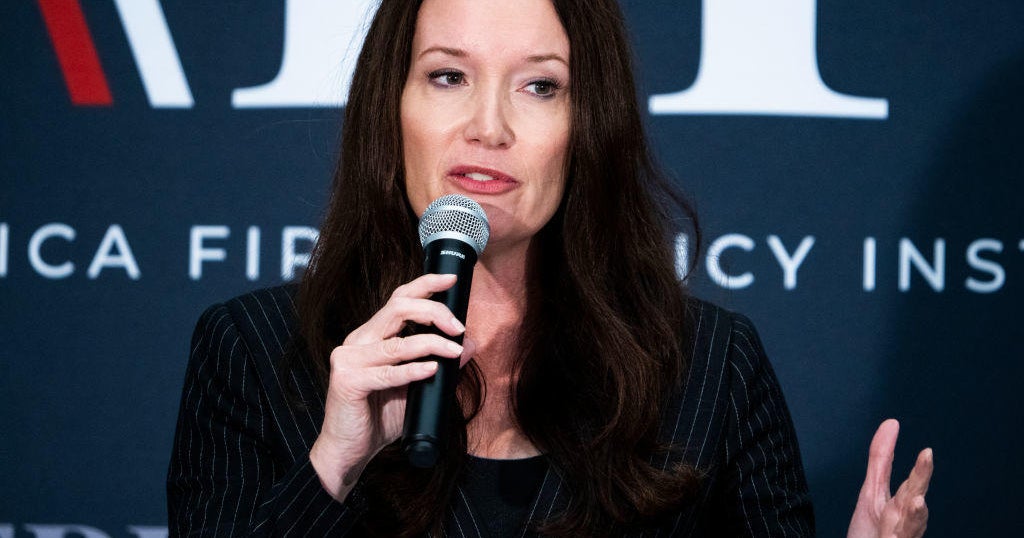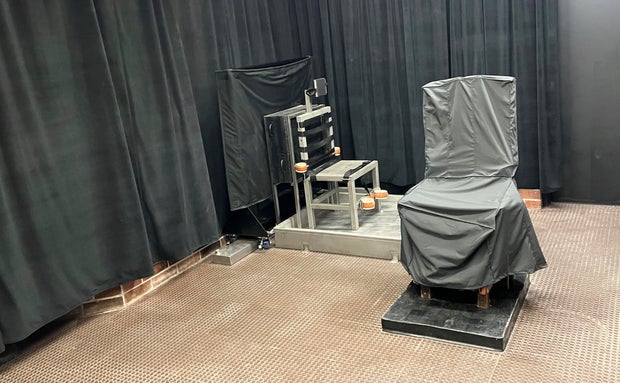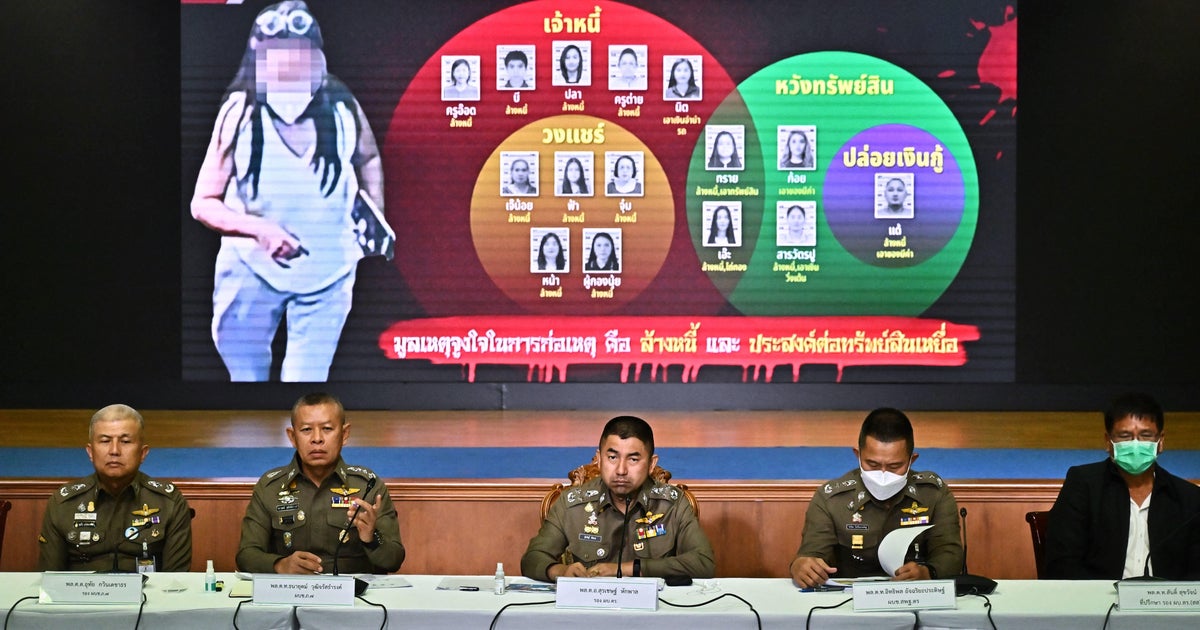CBS News
South Carolina death penalty methods are legal, including firing squad, state’s high court rules

South Carolina can execute death row inmates by firing squad, lethal injection or the electric chair, the state’s high court ruled Wednesday, opening the door to restart executions after more than a decade.
All five justices agreed with at least part of the ruling. But two of the justices said they felt the firing squad was not a legal way to kill an inmate and one of them felt the electric chair is a cruel and unusual punishment.
The state allowing inmates to choose from the three execution methods is far from an effort to inflict pain but a sincere attempt at making the death penalty less inhumane, Justice John Few wrote in the majority opinion.
“Choice cannot be considered cruel because the condemned inmate may elect to have the State employ the method he and his lawyers believe will cause him the least pain,” Few wrote.
As many as eight inmates may be out of traditional appeals. It is unclear when executions could restart or whether lawyers for death row inmates can appeal the ruling.
Gov. Henry McMaster said the justices interpreted the law correctly. “This decision is another step in ensuring that lawful sentences can be duly enforced and the families and loved ones of the victims receive the closure and justice they have long awaited,” he said in a statement.
Lawyers for the death row inmates said they were reviewing the 94-page ruling before commenting.
This decision follows arguments from lawyers representing a group of people on death row that the electric chair and firing squad are cruel and unusual punishments.
South Carolina Department of Corrections via AP, File
South Carolina has executed 43 inmates since the death penalty was restarted in the U.S. in 1976. Nearly all inmates have chosen lethal injection.
South Carolina hasn’t performed an execution since 2011. The state’s supplies of drugs for lethal injections expired and no pharmaceutical companies would sell more if they could be publicly identified.
The nation’s ongoing nationwide shortage of lethal injection drugs has also prompted states like South Carolina to turn to alternative execution methods like death by firing squad.
Lawmakers authorized the state to create a firing squad in 2021 to give inmates a choice between it and the old electric chair, which the law designated as the default execution method if lethal injection drugs were unavailable. The inmates sued, saying either choice was cruel and unusual punishment prohibited by the Constitution.
In spring 2023, the Legislature passed a shield law to keep lethal injection drug suppliers secret and the state announced in September it had the sedative pentobarbital and changed the method of lethal injection execution from using three drugs to just one.
The state’s high court allowed the inmates to add arguments that the shield law was too secret by not releasing the potency, purity and stabilization of lethal injection drugs.
The state said in its argument before the state Supreme Court in February that lethal injection, electrocution and firing squad all fit existing death penalty protocols. “Courts have never held the death has to be instantaneous or painless,” wrote Grayson Lambert, a lawyer for Gov. McMaster’s office.
But lawyers for the inmates asked the justices to agree with Circuit Judge Jocelyn Newman who stopped executions with the electric chair or firing squad.
She cited the inmates’ experts, who testified at a trial that prisoners would feel terrible pain whether their bodies were “cooking” by 2,000 volts of electricity in the chair, built in 1912, or if their hearts were stopped by bullets — assuming the three shooters were on target — from the yet-to-be used firing squad.
The first scheduled execution by firing squad was slated for April 2022 but did not come to pass after the state’s highest court issued a temporary order.
On the shield law, the attorneys for the inmate said they need to know if there is a regular supplier for the drug since it typically only has a shelf life of 45 days and what guidelines are in place to test the drug and make sure it is what the seller claims.
Too weak, and inmates may suffer without dying. Too strong, and the drug molecules can form tiny clumps that would cause intense pain when injected, according to court papers.
“No inmate in the country has ever been put to death with such little transparency about how he or she would be executed,” Justice 360 lawyer Lindsey Vann wrote.
Lawyers for the inmates did tell the justices in February that lethal injection appears to be legal when it follows proper protocols, with information about the drug given to the condemned in a manner that matches what other states and the federal government use.
South Carolina used to carry out an average of three executions a year and had more than 60 inmates on death row when the last execution was carried out in 2011. According to the Death Penalty Information Center, there are now 35 inmates on South Carolina’s death row.
Prosecutors have sent only three new prisoners to death row in the past 13 years. Facing rising costs, the lack of lethal injection drugs and more vigorous defenses, they are choosing to accept guilty pleas and life in prison without parole.
CBS News
Compromise deal reached at COP29 climate talks for $300 billion a year to poor nations

Countries agreed on a deal to inject at least $300 billion annually in humanity’s fight against climate change, aimed at helping poor nations cope with the ravages of global warming at tense United Nations climate talks in the city where industry first tapped oil.
The $300 billion will go to developing countries who need the cash to wean themselves off the coal, oil and gas that causes the globe to overheat, adapt to future warming and pay for the damage caused by climate change’s extreme weather. It’s not near the full amount of $1.3 trillion that developing countries were asking for, but it’s three times the $100 billion a year deal from 2009 that is expiring. Delegations said this deal is headed in the right direction, with hopes that more money flows in the future.
“Everybody is committed to having an agreement,” Fiji delegation chief Biman Prasad said as the deal was being finalized. “They are not necessarily happy about everything, but the bottom line is everybody wants a good agreement.”
It’s also a critical step toward helping countries on the receiving end create more ambitious targets to limit or cut emissions of heat-trapping gases that are due early next year. It’s part of the plan to keep cutting pollution with new targets every five years, which the world agreed to at the U.N. talks in Paris in 2015.
The Paris agreement set the system of regular ratcheting up climate fighting ambition as away to keep warming under 1.5 degrees Celsius above pre-industrial levels. The world is already at 1.3 degrees Celsius and carbon emissions keep rising.
Countries also anticipate that this deal will send signals that help drive funding from other sources, like multilateral development banks and private sources. That was always part of the discussion at these talks — rich countries didn’t think it was realistic to only rely on public funding sources — but poor countries worried that if the money came in loans instead of grants, it would send them sliding further backward into debt that they already struggle with.
“The $300 billion goal is not enough, but is an important down payment toward a safer, more equitable future,” said World Resources Institute President Ani Dasgupta. “This deal gets us off the starting block. Now the race is on to raise much more climate finance from a range of public and private sources, putting the whole financial system to work behind developing countries’ transitions.”
It’s more than the $250 billion that was on the table in the first draft of the text, which outraged many countries and led to a period of frustration and stalling over the final hours of the summit. After an initial proposal of $250 billion a year was soundly rejected, the Azerbaijan presidency brewed up a new rough draft of $300 billion, that was never formally presented, but also dismissed roundly by African nations and small island states, according to messages relayed from inside.
The several different texts adopted early Sunday morning included a vague but not specific reference to last year’s Global Stocktake approved in Dubai. Last year there was a battle about first-of-its-kind language on getting rid of the oil, coal and natural gas, but instead it called for a transition away from fossil fuels. The latest talks only referred to the Dubai deal, but did not explicitly repeat the call for a transition away from fossil fuels.
Countries also agreed on the adoption of Article 6, creating markets to trade carbon pollution rights, an idea that was set up as part of the 2015 Paris Agreement to help nations work together to reduce climate-causing pollution. Part of that was a system of carbon credits, allowing nations to put planet-warming gasses in the air if they offset emissions elsewhere. Supporters said a U.N.-backed market could generate up to an additional $250 billion a year in climate financial aid.
Despite its approval, carbon markets remain a contentious plan because many experts say the new rules adopted don’t prevent misuse, don’t work and give big polluters an excuse to continue spewing emissions.
“What they’ve done essentially is undermine the mandate to try to reach 1.5,” said Tamara Gilbertson, climate justice program coordinator with the Indigenous Environmental Network. Greenpeace’s An Lambrechts, called it a “climate scam” with many loopholes.
With this deal wrapped up as crews dismantle the temporary venue, many have eyes on next year’s climate talks in Belem, Brazil.
CBS News
GOP senator blocks promotion of general involved in Afghanistan withdrawal, sources say

The promotion of a three-star general who was part of the 2021 U.S. withdrawal from Afghanistan has been paused by Republican Sen. Markwayne Mullin of Oklahoma, three sources familiar with the move confirmed to CBS News Saturday.
Lt. Gen. Christopher Donahue was slated to be promoted to a four-star rank and take command of the U.S. Army in Europe. However, he was not included in a batch of nearly 1,000 promotions that moved through the Senate Armed Services Committee this week despite receiving a Pentagon recommendation.
Mullin has put a hold on the promotion. The intention is to allow for the new Republican-controlled Congress and President-elect Donald Trump to weigh in on the promotion given Donahue’s involvement in the Afghanistan withdrawal, two sources familiar with the situation told CBS News.
Behind the scenes, there is an effort underway by the Army and other allies to convince Congress to move forward and lift the hold, which appears to be politically motivated, sources said.
ALLISON JOYCE/AFP via Getty Images
During the campaign, Trump frequently mentioned his surprise that no officers were consequently fired by President Biden for the chaotic withdrawal.
Military officers execute U.S. policy but do not create it. It was the Trump administration that in February 2020 brokered the deal with the Taliban to withdraw U.S. forces from Afghanistan, but it was Mr. Biden who decided to execute that withdrawal despite the Taliban breaking the terms of that U.S. agreement.
Donahue was the last U.S. soldier to exit Afghanistan in 2021. The U.S. evacuated about 125,000 people, including 6,000 Americans, over the course of its withdrawal, during which dozens of Afghans and 13 U.S. service members were killed in a suicide bombing outside Hamid Karzai airport in Kabul.
The U.S. underestimated the speed with which the Taliban would capture Kabul and the well-documented U.S. logistical and planning failures have been a focus of multiple internal probes at the Pentagon, State Department, and in Congress.
An extensive State Department report released last year found that “insufficient” planning, communication failures and an inability to grasp “the scale and scope of the operation” contributed to the chaotic operation.
CBS News has reached out to Mullin’s office but did not receive a response. It is not clear whether Trump is aware of the hold.
contributed to this report.
CBS News
Trump picks former White House aide Brooke Rollins to lead the USDA

President-elect Donald Trump said Saturday that he will nominate former White House aide Brooke Rollins to be his agriculture secretary, the last of his picks to lead executive agencies and another choice from within his established circle of advisers and allies.
The nomination must be confirmed by the Senate, which will be controlled by Republicans when Trump takes office Jan. 20, 2025. Rollins would succeed Tom Vilsack, President Biden’s agriculture secretary who oversees the sprawling agency that controls policies, regulations and aid programs related to farming, forestry, ranching, food quality and nutrition.
Rollins, who graduated from Texas A&M University with a degree in agricultural development, is a longtime Trump associate who served as his former domestic policy chief. She is president and CEO of the America First Policy Institute, a group helping to lay the groundwork for a second Trump administration.
Tom Williams/CQ-Roll Call, Inc via Getty Images
Rollins, 52, previously served as an aide to former Texas Gov. Rick Perry and ran a think tank, the Texas Public Policy Foundation.
Rollins’ pick completes Trump’s selection of the heads of executive branch departments, just two and a half weeks after the former president won the White House once again. Several other picks that are traditionally Cabinet-level remain, including U.S. Trade Representative and head of the Small Business Administration.
Trump didn’t offer many specifics about his agriculture policies during the campaign, but farmers could be affected if he carries out his pledge to impose widespread tariffs. During the first Trump administration, countries like China responded to Trump’s tariffs by imposing retaliatory tariffs on U.S. exports like the corn and soybeans routinely sold overseas. Trump countered by offering massive multibillion-dollar aid to farmers to help them weather the trade war.
President Abraham Lincoln founded the USDA in 1862, when about half of all Americans lived on farms. The USDA oversees multiple support programs for farmers; animal and plant health; and the safety of meat, poultry and eggs that anchor the nation’s food supply. Its federal nutrition programs provide food to low-income people, pregnant women and young children. And the agency sets standards for school meals.
Robert F. Kennedy Jr., Trump’s nominee to lead the Department of Health and Human Services, has vowed to strip ultraprocessed foods from school lunches and to stop allowing Supplemental Nutrition Assistance Program beneficiaries from using food stamps to buy soda, candy or other so-called junk foods. But it would be the USDA, not HHS, that would be responsible for enacting those changes.
In addition, HHS and USDA will work together to finalize the 2025-2030 edition of the Dietary Guidelines for Americans. They are due late next year, with guidance for healthy diets and standards for federal nutrition programs.











